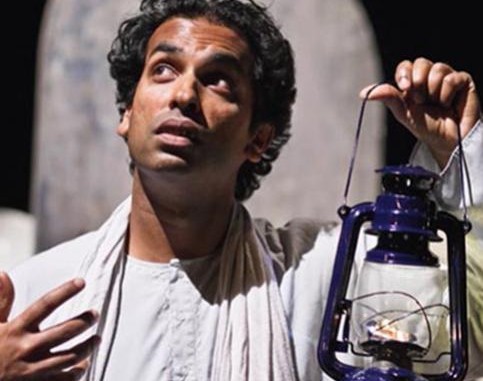
Perfect Theatrical Blend [by James Wenley]

The Guru of Chai brews his tea to perfection, carefully measuring the exact combination of herbs and spices. It is an art that simmers through this play. He’s unappreciated at his stall, plagued by Starbucks. We don’t get to sample his tea, but I’ll wager this: He’s an even better storyteller.
And really, that credit is to Indian Ink’s Justin Lewis and Jacob Rajan, who distill their storytelling to an exact perfection. I was first transported by the Guru’s tale in 2010 at the University of Auckland Drama Studio, home base of dramaturge Murray Edmond, when they were first previewing their new work (following Krishnan’s Dairy, the Candlestick Maker, The Pickle King, and The Dentist’s Chair) to small and appreciative audiences; they also took the play into people’s private homes. After a NZ tour and bigger season at the Maidment Theatre last year, they have recently gone overseas with the show to places such as Singapore, LA, Tennesse and Sydney. With many theatre productions flash of the pan stuff, it is remarkably rewarding to revisit the show for its Q Theatre season (a proud achievement for Lewis, who helped shepherd Q’s existence). Chai has had time to breathe and to grow richer.
Jacob Rajan totters onto the stage; a set of bad teeth a nod to the mask work that the company is famous for. Rajan plays to, and with the audience, magnificently; from the start he asks us to turn off our ‘cell-o-phones’. And then – he insults the audiences, implicating Q Producer James Wilson in the process. We are unhappy and our lives are meaningless, among other things. He asks a woman in the audience what her name means, she does not know – a point well made. Our hopes and dreams are dust. But tonight, Rajan grandly announces, our “problems will be gone”.
Rajan is not alone in his telling, a constant presence is David Ward, the musician, who cannot speak. But what he can do is sing, and accompanies the storytelling superbly on a variety of instruments. He has an emphatic face, feeding energy into the tale.
Rajan steps onto a smaller platform at the top of the stage where the ‘guru’ Kusitar begins his story, based loosely on the ‘Punchkin’ fairytale, hopping off the platform each time he wants to provide commentary or enlist the audience’s complicity. As a story the mythological and the everyday collide; the elephant God Ganesh is present the first time Kusitar sees seven sisters singing at the train station where he works. We get a sense too of the vividness of life in modern India, filled with dangerous streets and criminals, corruption, cock fighting, and the hope of love.
The story in broad strokes: Kusitar gets himself tangled up with the singing sisters, who get police protection from good-hearted policeman Punchkin after they are threatened by the Fakir. One by one they get married and stop singing each day, until only the youngest Balna is left, who Punchkin has fallen in love with. But let Rajan tell you what it happens next.
Rajan both narrates as Kusitar, and plays the different characters, all with a lift or lowering of his voice and adjustment in his body; a consummate solo performer and communicator.
Part of the magic of this show in its discovery, so I won’t say much more. Part of its charm is the little theatrical tricks woven into the telling, and the gentle involvement of the audience – watch out for the Dead Parrot. This didn’t stop me in enjoying it the second time – I could look forward to certain moments, and gained a deeper appreciation for its storytelling craft and Rajan’s captivating performance.
There is a high-risk narrative twist, causing you to re-evaluate the cause and effect of the play, and it is rather a bitter one. A character says, “Truthfully, I lie”, and that statement describes the whole show: a sweeping fairy tale with larger than life characters in a fantastic land, but containing painful and beautiful truths.
And while at the end we aren’t offered any startling Guric advice to turn our lives around, I did realise that for the last hour and a bit I had been firmly transported away from my own problems and out of my own head. A gift.
Guru of Chai is presented by Indian Ink Theatre Company and plays at Q until 21st July. More details see Q.
SEE ALSO: Theatreview.org.nz review by Nik Smythe




Leave a Reply